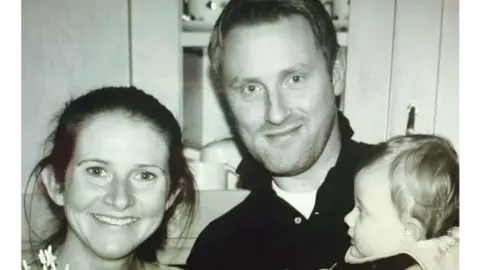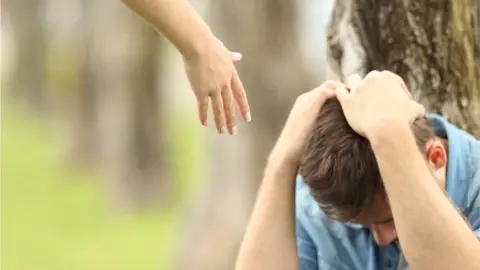Male suicide rates in Wales 'a national emergency'
 Rhian Burke
Rhian BurkeThe number of men who die by suicide should be considered a "national emergency", a group of AMs has said.
There should be as big a focus on mental health as physical health in order to reduce the number of suicides, the health, social care and sport committee said.
Last year, 360 people took their own lives in Wales - the highest figure since 1981 - and 278 of those were men.
The Welsh Government said it would consider the group's recommendations.
The 31 recommendations in the wide-ranging report on suicide prevention included calls for:
- The Welsh Government, health boards and councils to fund suicide prevention
- A suicide prevention training framework to be implemented across all public services in a similar way to domestic violence training
- A target be introduced for waiting times for psychological therapies
The committee said it was shocked by the lack of support services for those bereaved by suicide.
It said a few organisations provided support, but they received little public money and there was not a consistent approach across Wales.
Rhian Burke set up the charity 2 Wish Upon A Star to provide support to bereaved families who have lost a child or young adult under the age of 25.
In 2012 her husband Paul took his own life five days after their baby son George died suddenly from bronchial pneumonia and influenza.
She said following the death of their son the couple received no support and, after her husband's suicide, "the same thing happened again".
"Everyone we spoke to was lovely, but there wasn't much support and not much support immediately. The family liaison [police officers] had no in-depth training and I had GPs Googling support. You ring and you get answer phones and you wait for people to reply."
The charity receives referrals from A&E departments, critical care units and mortuaries and tries to avoid families having to self-refer. The aim is to contact the family within 24 to 48 hours to offer them support.
She said in 2017 around a third of their referrals were because of suicide.
"When you lose someone through suicide, you live with the guilt, thinking 'could I have stopped it?' You need someone to sit with you to help you rationalise."
 Getty Images
Getty ImagesThe committee also said:
- It was concerned by evidence that showed that only 60% of children who end up in hospital after self-harming received psychological assessments
- The Welsh Government needed to take urgent action to ensure all doctors in Wales understood the guidelines about sharing information so they could share concerns to prevent anyone taking their own life without fear of being sacked for breaching confidentiality
- More needed to be done to reduce the stigma associated with mental health which prevented people from talking about it.
Dr Dai Lloyd AM, who chairs the committee, said everyone had a part to play in reaching out and offering support to those in need.
"We know that if someone is having suicidal thoughts, receiving support from someone else can make a big difference," he said.
A Welsh Government spokesman said they welcomed the publication of the report.
"We will consider the recommendations in detail, along with those in the Talk to me 2 [the Wales suicide and self-harm prevention action plan] mid-point review, before responding in due course," he added.

If you are struggling to cope, you can call Samaritans free on 116 123 (UK and Ireland) or visit the BBC Action Line website.
You can also contact the Community Advice and Listening Line for Wales, which offers free confidential support with help to find local mental health services, on 0800 132 737 or text 'Help' to 81066.
